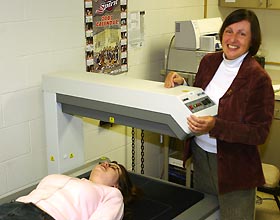|
This is an archived article.
For the latest news, go to the
Advance Homepage
For more archives, go to the Advance Archive/Search Page. | ||
|
Researcher Finds Bones Adversely
Caffeine, alcohol, and smoking may influence how likely a person is to develop osteoporosis or break a bone in their later years. The effects of each are the subject of a study by Jasminka Ilich-Ernst, a registered dietitian and associate professor of allied health. New figures just released by the National Osteoporosis Foundation indicate that osteoporosis and low bone mass are a major public health threat for 55 percent of the U.S. population aged 50 and older.
Several years ago, Ilich-Ernst embarked on a study to investigate the link between sodium and osteoporosis. Although that work will not be completed until the end of the year, the reams of data collected so far have shed light on several other lifestyle factors that might influence bone health. "While doing our preliminary calculations, it was immediately obvious some factors such as smoking are detrimental to bone health, while others, if kept to a moderate level, could actually be beneficial," says Ilich-Ernst, who has been researching the effects of calcium and other vital nutrients on bones in animals and humans for 20 years. For this study, 136 healthy women aged from 60 to 80 were recruited. They were not taking any medications, such as hormone replacement therapy, that might affect bone density. Each participant completed a series of questionnaires for determining the source, amount, and frequency of calcium, alcohol, and caffeine in their diets, as well as their smoking history and level of physical activity over their life span. Their bone mineral density was measured, in part, using a dual X-ray absorptiometer, better known as a DEXA, which takes a full body scan distinguishing between soft tissue and bone. It also measures different areas of the skeleton, including the hip, spine, and arm regions. Her findings indicate that no matter how long ago former cigarette smokers had given up the habit and how much they smoked, their bone health was compromised. Her study did not document possible variations in the amount of smoking and the degree of bone deterioration. In her study, caffeine also showed adverse effects on bone mineral density, especially in women who had lower calcium intake. Caffeine does contain some helpful minerals, however, such as magnesium and possibly some antioxidants, says Ilich-Ernst. Her advice: "Do not drink more than two cups a day, and if possible take milk with it to offset some of the calcium loss." Alcohol in small or moderate amounts, particularly wine, stimulates metabolism of estrogen, which Ilich-Ernst says is beneficial for bone health, the heart, and the brain's memory function. The catch is that too much alcohol can be poisonous for bone cells, so she suggests people limit themselves to a glass of wine a day. To ensure strong, healthy bones, Ilich-Ernst passionately advocates a balanced diet consisting of natural foods and plenty of low-fat dairy products as a source of calcium. "If possible, people should take all their nutrients from real food," she says. "Forget the processed and ready-made products." But for those who smoke, have recently kicked the habit, or consume large quantities of coffee or caffeine, and who can't get enough calcium from food, Ilich-Ernst believes a calcium supplement on top of a healthy diet is needed. No matter what steps anyone takes to improve calcium levels, Ilich-Ernst says no one can completely recover the bone mineral density they had as a young person. "However, by getting the recommended daily intake of calcium an older person can slow down the bone loss, while younger people will maintain the bone mass," she states. The National Academy of Sciences recommends 1,200 mg of calcium a day for post-menopausal women, 1,000 for young adults, and 1,300 mg for teenagers. Ilich-Ernst's findings were published in the December issue of the Journal of the American College of Nutrition. |

